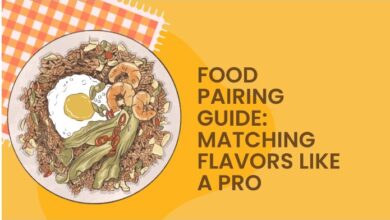The Secret Ingredient: Love in Food Preparation

When it comes to cooking, love is an intangible but crucial element that can make or break a dish. It’s not an ingredient you can measure with a spoon or find on a grocery store shelf, but its presence can transform an ordinary meal into something extraordinary. In this article, we’ll delve deep into the concept of love in food preparation, exploring how it influences the taste, the experience, and the connection between the chef, the food, and the diner.
Introduction
Food has always been more than just sustenance. It’s a universal language that transcends borders and cultures, and at the heart of it all is the passion and love that goes into creating it. Whether you’re a professional chef in a Michelin-starred restaurant or a home cook preparing a family dinner, love is the secret ingredient that elevates your culinary creations.
The Science Behind Love in Food
Before we explore the emotional and psychological aspects of love in food, let’s take a moment to consider the science behind it. Research has shown that when people prepare food with love and care, their brain releases a cocktail of feel-good hormones like oxytocin and dopamine. These hormones not only enhance the cook’s mood but also have the power to influence the taste and aroma of the food.
When we cook with love, we tend to be more attentive to details, use fresh and high-quality ingredients, and take our time to ensure everything is just right. All of these factors contribute to a better end product.
The Art of Cooking with Love
Cooking with love isn’t just about following a recipe; it’s about infusing your personality, creativity, and positive energy into every dish you create. Here are some key ways in which love manifests in the art of cooking:
Mindful Preparation
Cooking with love starts with being present in the moment. It’s about dedicating your full attention to the task and savoring every step of the cooking process. When you chop vegetables, do it carefully; when you simmer a sauce, do it patiently. This mindfulness can elevate even the simplest of dishes.
Personalization
Adding a personal touch to your cooking is a surefire way to infuse love into your food. Whether it’s a secret family recipe, a special ingredient you love, or a unique plating style, these personal touches create a connection between you and the food, as well as between the food and the diner.
Presentation
They say we eat with our eyes first, which couldn’t be more accurate regarding love-infused dishes. Taking the time to present your food beautifully can make it more appealing and show that you care about the diner’s experience. Even a simple meal can become a work of art.
Sharing
Food is a communal experience, and sharing it with others is an act of love. Whether you’re cooking for your family, friends, or even strangers, the front of nourishing others is a powerful way to express love and care.
The Impact of Love on Taste
Now that we’ve explored how love is infused into the cooking process let’s discuss its impact on the taste of food. Have you ever noticed that a meal prepared by someone who cares about you always tastes better? This phenomenon has a scientific justification.
Enhanced Flavor Perception
When we cook with love, we pay more attention to seasoning and flavor combinations. We are likelier to perfection adjust the salt, pepper, and spices. This heightened awareness of detail results in a dish with balanced and well-developed flavors.
Texture and Consistency
Love in cooking isn’t just about taste; it’s also about texture and consistency. Chefs who put their heart into their dishes are likelier to nail the perfect surface, whether it’s a tender roast, a creamy soup, or a crispy dessert. This attention to detail creates a more enjoyable dining experience.
Emotional Connection
Food prepared with love has a unique ability to evoke emotions. It can bring comfort, joy, nostalgia, or even tears of happiness. When we cook for someone we love, we essentially serve them a plate of our emotions, and that emotional connection is palpable.
Love in Professional Cooking
Professional chefs understand the importance of love in their craft. In the world’s finest restaurants, chefs are not just culinary artists but also masters of emotion and experience. Here’s how pet plays a pivotal role in professional cooking:
Innovation and Creativity
Chefs in high-end restaurants constantly push the boundaries of gastronomy. They play around with novel components, methods, and presentations. However, at the core of their innovation is a deep love for food and a desire to create unforgettable dining experiences.
Consistency
Consistency is vital in the restaurant industry. Chefs must replicate the same exquisite flavors and presentations night after night. Love for their craft motivates them to maintain high standards, ensuring every guest receives a memorable meal.
The Art of Plating
In Michelin-starred establishments, plating is elevated to an art form. Each dish is meticulously arranged to be visually stunning, enhancing the overall dining experience. This level of attention to detail is a testament to the love chefs pour into their work.
Conclusion
In food preparation, love is the secret ingredient that elevates a dish from mere sustenance to a memorable experience. Whether you’re a home cook or a professional chef, infusing your food with love can enhance its taste, aroma, and emotional impact. Cooking with mindfulness, personalization, presentation, and a spirit of sharing can make every meal a work of art.
So, the next time you step into the kitchen, remember that love is your most potent culinary tool. As you chop, sauté, and simmer, let your love for food and those you’re cooking for shine through, and you’ll create dishes that satisfy the palate and warm the heart.
FAQ
Q1. Does cooking with love make a difference in the taste of food?
Yes, cooking with love can make a significant difference in food taste. When you cook carefully, you are more likely to use fresh and high-quality ingredients, season effectively, and pay close attention to texture and consistency. All of these factors contribute to a more delicious and well-balanced dish.
Q2. Can love-infused cooking be taught, or is it innate?
Love-infused cooking can be taught to some extent, but it also has an innate component. While culinary skills can be learned and improved over time, the genuine passion and love for food often come from within. The best chefs combine both talent and love to create exceptional dishes.
Q3. Are there specific dishes or cuisines where love in cooking is more important?
Love in cooking is essential in all types of cuisine and dishes. Whether you’re preparing a simple homemade meal or a complex gourmet dish, infusing it with love can enhance the overall experience for the chef and the diner.
Q4. Can you taste the difference between a meal prepared with love and without?
While it’s challenging to quantify love in food, many people believe they can taste the difference between a meal prepared with love and one that isn’t. A lovingly prepared dish’s enhanced flavor, texture, and emotional connection often make it stand out memorably.
Q5. How can I learn to cook with love?
Learning to cook with love begins with mindfulness in the kitchen. Pay close attention to each step of the cooking process, use fresh and quality ingredients, personalize your dishes, and take pride in your presentation. Most importantly, cook for others intending to nourish and share; you’ll find that love naturally infuses your cooking.


